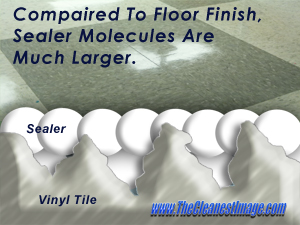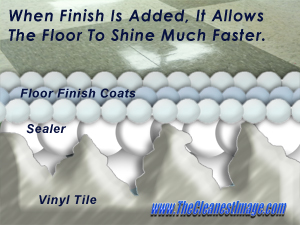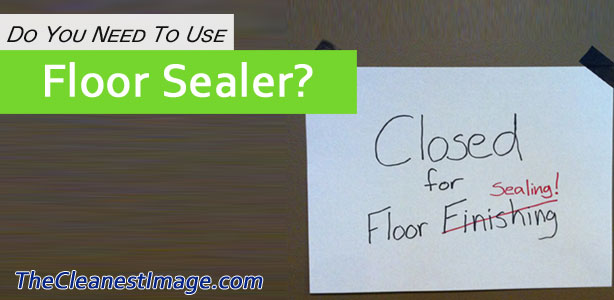One of the more common questions when it comes to finishing floors, Do you need to use a vinyl floor sealer?
The debate goes back and forth on whether you need to use sealer on tile prior to applying finish.
This lack of understanding is due to a few common misconceptions.
Although there have been many that have written on the topic, it seems few get it right. I will try to clear it all up for you.
What Is Vinyl Floor Sealer?
Floor sealer is a polymer based coating that protects vinyl tile floors. It acts much like a floor finish. It is fairly easy to apply and is very durable.

What allows it to hold up so well is the make up of the polymer molecules. Their size is larger than standard floor finish, which is pretty standard across the board regardless of brand or solids content.
Since there are only a few manufactures of floor finish polymers in the world, the manufactures all use similar compounds when blending their finishes. The floor finish solids content only reflects the amount of polymers that are used in the finish.
A floor sealer uses a completely different size polymer that is significantly larger than floor finish. This makes a much stronger film on the floor. It also fills in the pores of the floor faster. The larger molecules stack up quicker, thus reducing the amount of floor finish that is needed.
Floor sealers can be used at a ratio of 1:2, meaning that 1 coat of floor sealer equals 2 coats of regular floor finish. Although the cost of floor sealer is usually about a third more that standard floor finishes, at 1:2 it becomes more economical.
Why Does Floor Sealer Not Shine?
When a floor sealer is used on vinyl floor tile, the larger polymer molecules are not a microscopically smooth as floor finish. This prohibits the light from reflecting directly back to the eye. Because the light is deflected, it loses some of its energy and therefore appears dull to the eye.
With some tile sealer polymers though, a burnisher can be used to thermally smooth the floor, thus producing some shine. applying a floor finish over a floor sealer is the best way to achieve a glossy maintainable floor.
When Should You Use Floor Sealer?

There are a lot of opinions on this subject but here is my standard rule of thumb. When you plan on maintaining the floor coating and doing regular scrub and re-coating is when you need to use a sealer.
Since there is a desire to prolong the duration between stripping or removing the film, the floor sealer provides a solid base to work with. With any tile maintenance program, the goal should be to keep the dirt from grinding through to the tile itself. The best way to do this is to lock up the pores with a floor sealer.
This also reduces the cost for the initial coating process.
The draw back to floor sealer is that the larger molecules are potentially more difficult to remove once it is time to strip the floor.
Because of this, a floor care program that includes completely stripping the floor on a regular, short-term (1 year or less) basis, should use a regular floor finish to lessen the time it will take to strip the floor.
Other Uses For Floor Sealers
While most vinyl floor sealers are intended for use on vinyl tile, over the years, I have found several other uses.
Any floor that is very porous becomes a candidate for sealer. Specifically rubber floors come to mind.
Many rubberized flooring manufactures do not recommend any coatings but in my experience they become extremely difficult to maintain.
The deep pores and flexible surface attracts and holds dirt, leaving them dull and dingy.
Applying 2-3 coats of a floor sealer fills in the pores and makes cleaning much easier. Sealing up the pores and removing the dirt also increases the traction on the floor, making it safer as well.
What Is A Sealer/Finish Then?
There are products known as sealer/finish. The main distinguishing factor with true sealer/finishes are, once again, the size of the polymer molecule. The size of a sealer/finish molecule is in between a floor finish molecule and a floor sealer molecule.
This makes it easier and quicker to build up a base while still providing some shine because the molecules are able to be closer together.
The real determining factor with whether to use a floor sealer or not is your maintenance program. If you are able to maintain a floor over completely refinishing it, floor sealers are an easy way to save money and achieve a long-lasting shine.
